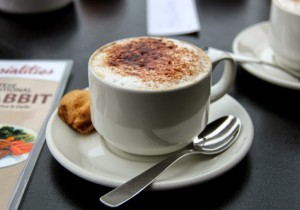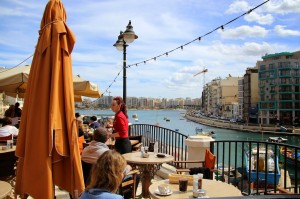I have studied France for a long time—the language, the politics, the people. But no matter the detail of my textbook pages at Pitt, no matter how many times I read the same paragraph to myself nestled, in the stacks of Carnegie Library, I could never have claimed to know the culture the way I do (or at least am beginning to) now. I'm closer now, of course, as I write to you from my host-family's garden, about 5,000 miles away. I hope that through my words, you may experience a part of France and my life here, but as with my textbooks, what I write can only paint a picture of limited dimension. No matter how many times I go back and rephrase, my words will not become living.

It's really windy today in Aix, so much so that the big cedar tree consistently showers me with white winged seeds and baby pine cones that burrow within my hair. And when the wind rushes through Cours Mirabeau on a day like today, everyone bundles up in layers and layers of dark clothing. The lack of color on the streets may have been my first experience of culture shock. My host grandmother tells me that as the weather warms up, the people will begin to shed the sombre shades to reveal bright hues. And after looking absolutely ridiculous (more times than I can count, particularly in my hot-pink rain jacket), this I have to see.
In Aix, the world drinks coffee together on mornings like this. The cafés are filled with women and men, young and old, with newspapers, good company, or nothing at all, sipping their cafésfor hours, chairs turned to face the streets to watch the world go by.
It's easy to join them. Grab a seat, order your café crème—coffee with milk, like most Americans do. For a moment, you'll pass as a local.

Let's say you come back in the afternoon. As before, the café is filled with people-watchers, and you stroll right up to the waiter. "Bonjour monsieur," you smile, proud of your accent, so much better than the Swedish backpackers who ordered before you. "Un café crème, s'il vous plait." The waiter turns to face you and flashes you a look: the tourist smirk. You've been made, and your forehead may as well read ÉTRANGERE because, as you've just found out the hard way, coffees with cream or milk are only one of two things: breakfast drinks or tourist red flags.
Thankfully, when you go to pay for your café, you'll find that you have a chance to redeem yourself. For some reason that I have yet to understand, the people of Provence (and perhaps all of France) delight in exact change, and will shower you with praise if you succeed. God forbid you, or anyone you're associated with, attempts to break a large bill at the boulangerie or local café.

As you leave, turn to say goodbye to your friends. And because the theme is to fit in with the French, you go for the biseau—perhaps one of the most perplexing things for me as an American up to my neck in French culture. In France, biseau, or kisses on the cheek(s), vary in fashion and number depending on the region. In the South, they are done as follows. (You're gonna need a buddy for this.)
Grab your partner, and have them face you. Lean your head to the right to bise their left cheek, and then quickly do the same to their right. But faites attention! When "bising", simply brush your cheek against your partner's and make a kissing noise—do not actually kiss their cheek (the lips shouldn't touch either!).
To sum it all up: lean right, then left. After a little practice, it's simple, and one would think that the biseau would no longer cause problems. Which is exactly what I thought after a little practice on my first day. Boy was I wrong. I lived in absolute fear of the biseau for several weeks—do I bise my French family every time I see them? Just once in the morning? When we say good night? Do I bise children? Men and women? Strangers? Sadly, even when I thought I'd finally gotten the hang of it, my biseaux nightmare wasn't over when I met my host mom's friend. She is québécoise and, as I learned the hard way, kisses the right cheek first. This led to an unfortunate moment that resembled that dance that people walking opposite ways do to avoid crashing into one another in the street, except so much worse.
There are so many more idiosyncrasies I wish I could illustrate, so many quirks that make this culture so whimsically charming. I had to learn them the hard way, and I continue to do so in my classes, on the street, and with friends and my family. But that is exactly what it means to discover and experience a culture. I've found it's a gradual process with room for inevitable mistakes. It's laughing with my host family when I just can't seem to figure out when to bise, and it's all the funny looks I get for running in the park. It's comparing dialects and accents with my host-grandmother, and learning which French slang is acceptable, and when is not.
But understanding of a culture surfaces when you realize that you've begun to see the world differently, and those things you once thought were strange replace normalcy. Sometimes, the best way to learn is from inside-out, sink or swim.

Lindsay Bayne is the Spring 2014 CEA MOJO in Aix-en-Provence, France. She is currently a junior at the University of Pittsburgh.










